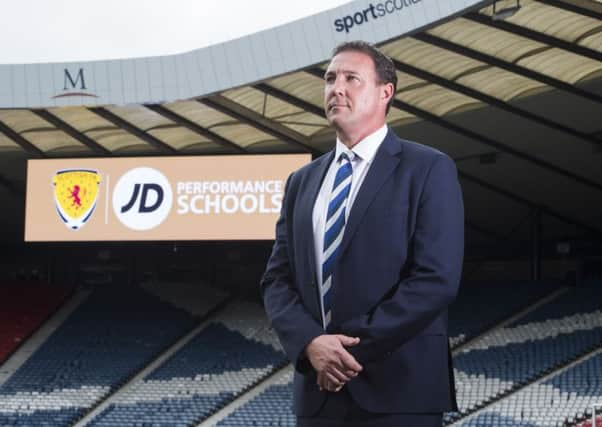Malky Mackay says SFA working to develop stand-outs, not drop-outs


There are numerous examples of gifted teenagers who, for whatever reason, fail to fulfil their potential and end up disillusioned and drifting away from the sport.
Mackay is convinced that the SFA’s policy of inculcating good habits into these pupils will means that fewer of them will suffer that fate and that Scottish clubs, as well as the national team, will benefit as a consequence. Mackay wants to ensure that the SFA can mould impressionable minds.
Advertisement
Hide AdAdvertisement
Hide Ad“We need to train them and educate them into a culture from the age of 12; after that human nature is such that, when they’re 16, it becomes part of what you are and who you are,” he said yesterday. “We must produce technical players but also boys who are mentally strong and desperately want to become footballers. Then the drop-off rate will be less.”
Mackay, though, is conscious of how many families in the most deprived parts of the country are simply unable to find the money required for their children to be registered with local clubs.
Scotland’s best footballers have invariably come from those backgrounds and the SFA is at least attempting to ensure that they do not miss out on the next Jimmy Johnstone or Jim Baxter.
“The Scottish FA is for grassroots, women’s football, disability sport and for the country and the people of Scotland,” said Mackay.
“The wee kid who couldn’t afford to play for a club through a direct debit could in the past play for his school. Everyone used to know who the best players were because they were in the school team.
“Schools would breed these talented youngsters through the help of janitors and teachers but that changed following the strikes in the 1980s; now we have boys’ clubs who have parents paying by direct debit.
“But we get out as much as possible to look at players and spread our resources as far as we can to give everyone a chance. We’ve set a talent ID department to try and find them, we’ve sent scouts out and have a database to find players and we’ve found some who haven’t been in our system.”
Mackay is at least confident that those who have made it as far as the development schools have been provided with a clear pathway into the professional game. In 2017, 44 graduates earned professional contracts and eight of them – Hearts quartet Harry Cochrane, Connor Smith, Anthony McDonald and Chris Hamilton, Dundee United pair Scott Reekie and Logan Chalmers, Ethan Erhahon of St Mirren and Aberdeen’s Dean Campbell – have already made first-team debuts.
Advertisement
Hide AdAdvertisement
Hide Ad“I was talking downstairs to the kids coming into the performance schools this year,” he said. “Eight of their predecessors made their senior league debuts last season, which is the highest number ever for 16-year-olds.
“There are three groups now who’ve come out of the performance schools and into full-time football and 100 of them now have professional contracts; you look at Hearts bleeding in the likes of Harry Cochrane.
“Our Under-21s went to Toulon for the summer to compete in the most prestigious tournament for that age group in the world.
“We took a couple of wild cards in 16-year-old Chris Hamilton from Hearts and Billy Gilmour from Chelsea. They both got time on the pitch and Billy was voted breakthrough Player of the Tournament, ahead of 220 other players. He also became our youngest-ever scorer at that level and captained the team in the third and fourth place play-off.”
Mackay is also convinced that, as a result of the work being done by the SFA and our leading clubs, the traditional failings of homegrown players are being eradicated.
“Our programme is getting better because of the quality of the players coming through,” he claimed. “The fact that most of them go to these facilities during the day at the schools and then train with their clubs at night also helps.
“Celtic, Rangers and Hearts have their own academies as well so, with that, these kids are getting double the number of touches of the ball every week than they would do otherwise.
“We’re now getting to the stage where, when we played Croatia at Under-16 level last year, we were technically better than they were. I’ve never known that to be the case before. That same group now play at Under-17 level and last November they beat Germany and Spain. In that whole year they had more possession than every team they played against, which is unheard of here.”